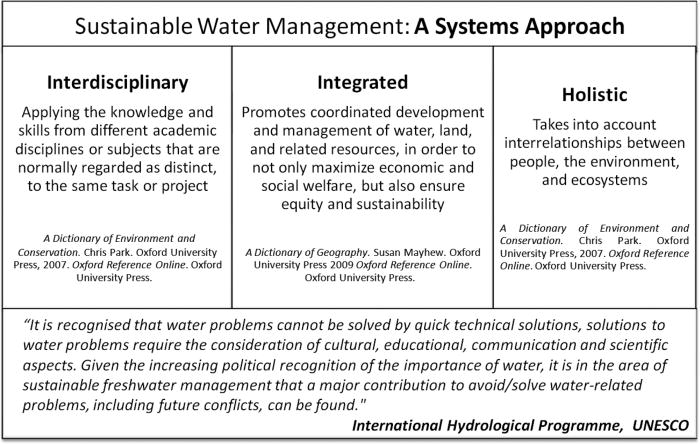A few weeks ago, Alozie led a PhD workshop on systems thinking; exploring the concept’s theoretical roots and some research applications in both the management of water resources and mineral active regions.
Systems thinking in simple terms implies a rather general and superficial awareness of systems (a purposeful structure that consists of interrelated and interdependent elements or components) and using that awareness to treat something (a problem, an occurrence, a phenomenon) as a system. The concept has emerged in mainstream environmental science as a means to address the complex nature of environmental problems and as a result of the criticisms and limitations associated with more conventional and reductionist management thinking (“divide and conquer mentality”). Treating an environmental problem as a system, necessitates the understanding of complex interactions that ultimately make up that system. This provides you with more opportunities to decipher the causalities that shape such problematic situations. Isn’t that useful?

Of course, systems thinking is not without its flaws. There is much ambiguity in the way systems thinking is applied in practice. Many of those who criticise systems thinking often refer to the impossibility of understanding all those complex interactions. Indeed, there are inherent knowledge gaps that may hinder the adoption of systems thinking. Yet, the potential for more informed policy decisions creates a much needed research rationale for this topic. This is why systems thinking is a core component of the work we are doing and we believe that it is worth investigating to see whether there is truly a place for systems thinking in how environmental policy and management might evolve in the future.
Here’s what Alozie had to say with regards to the potential for systems thinking to help transition towards sustainable management of mineral active regions like the Niger Delta:
“Mineral exploration and exploitation in regions of mineral wealth come with attendant environmental impacts, which also couples social and economic effects. The multi-faceted and multi-sectoral nature of activities in these regions coupled with socio-ecological and economic interactions make management complex.
Attempts to understand the problems that characterise these regions have been reductionist in approach with studies that usually reflect discipline-based bias either looking at ecological effects, economic or social dimensions of such activities. The implication being that some of the studies undertaken approach the problem from a linear and reductionist perspective thus seeing these interactions from the lens of cause and effect against a holistic perspective, which attempts to understand how activities in the system interacts and impacts the system as a whole. These approaches are usually normative and only identify parts of the problem. Solution and management remain limited and elusive because they fail to address the problem that plague mineral active regions in a holistic scheme that could consequently deliver significant change and benefits to such stressed regions.”
We hope that you enjoyed this post. Stay tuned for more research updates. For more information about the Environmental Quality Research Group, please click here.
References
Voulvoulis, N. (2012) Water and sanitation provision in a low carbon society: The need for a systems approach, Journal of Renewable and Sustainable Energy, Vol:4, ISSN:1941-7012.